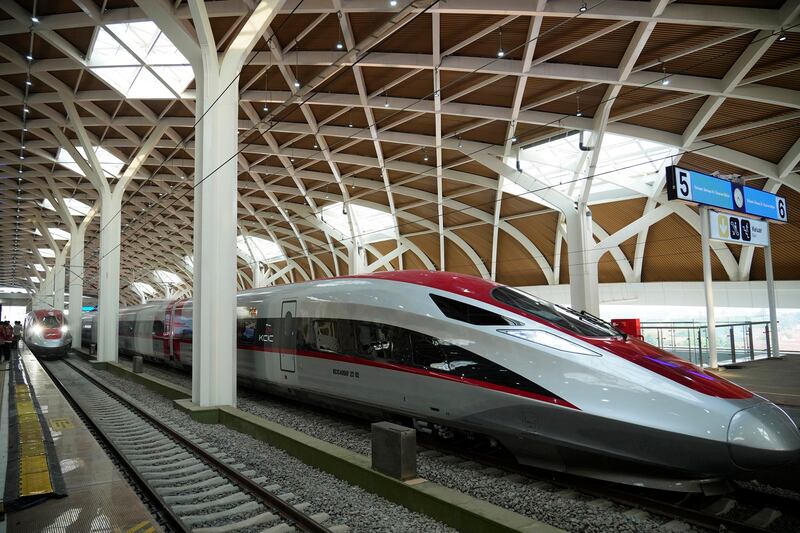China's Communist Party has vowed to step up control of the country's financial system, using "Marxist financial theory" to stave off systemic risks and boost the flagging economy.
"Risk prevention and control" were highlighted as "the eternal theme" of financial policy amid spiraling local government debt and a burst property bubble, according to an official report on the five-yearly Central Financial Work Conference that ran behind closed doors in Beijing from Oct. 30-31.
The conference, chaired by President Xi Jinping, also sent the message that the central government in Beijing under Xi will be taking back control of financial policy that had until recently been left to local governments.
The communique "emphasizes the need to adhere to the centralized and unified leadership of the party Central Committee over financial work," state news agency Xinhua reported.
The conference, delayed by a year due to COVID lockdowns, comes after a major government restructuring by Xi, who now heads the powerful Central Financial Commission, regulating the central bank and all of China's financial markets.
The communique also alluded to "contradictions and problems" in the financial sector in recent years, suggesting that Xi is now presiding over what he sees as a clean-up operation, restoring top-down order to an unruly and unpredictable sector of the economy.
The report said better governance and political awareness is needed to ensure that the financial sector is made to serve the "real economy."

"There are still many hidden economic and financial risks, the quality and efficiency of financial services to the real economy are not high, and financial chaos and corruption problems continue to occur," it said. "Financial supervision and governance capabilities are weak."
"The financial system must effectively improve its political position ... and contribute to the construction of a strong country and the great cause of national rejuvenation," the conference communique said, vowing to "severely crack down" on illegal financial activities.
‘Standardized’ sale of stocks and bonds
To that end, the ruling party plans to engage in the overall management of real estate financing, with a view to building more affordable housing amid a "new model" of real-estate development, according to Xinhua.
The issuance of shares and debt on financial markets will be "standardized" while management of foreign exchange markets will be strengthened, with the renminbi exchange rate maintained "at a reasonable and balanced level," the communique said.
"[We must] defuse risks, resolutely punish illegal, criminal and corrupt behaviors, and strictly prevent moral hazards ... and improve the early correction mechanism of financial risks with hard constraints," it said.
The report also indicated that Xi has included financial management in his personal brand of political ideology, calling it "an important innovative achievement of Marxist political economics on financial issues" that will serve as a basis for his "new era."
The theory states that financial operations must be geared to serve government goals, including the Belt and Road outreach, supply chain and infrastructure program, boosting domestic demand and funding new technologies.
"All regions and departments, especially the financial system, should further unify their thoughts and actions with the spirit of General Secretary Xi Jinping’s important speech and the decisions and arrangements of the Party Central Committee ... and solidly implement them," the conference report said.
Signals
Chen Chung-hsing, director of the New Economic Policy Research Center at Taiwan's National Dong Hwa University, said the meeting is signaling that all financial authority will now stem from the Central Committee under Xi.
"This is somewhat doubtful, as Xi Jinping doesn't know much about finance," Chen said, adding that some of the conference's goals seem self-contradictory.

"Regarding the problems of financial management in the past, if they are keen to fight corruption, then a lot of banks are going to tighten their lending," he said. "But in practice, they will need to relax lending to help the economy."
Chinese financial commentator Si Ling agreed, saying supervision needs to be looser rather than tighter to stimulate growth.
"The contradiction lies with the fact that Xi Jinping regards finance as a tool with which to maintain political, economic and social stability," Si said. "He is continuing to emphasize that everything is controlled by the party."
But exerting too much control over the financial sector could backfire, he said.
"The more financial supervision they engage in, the more vitality is lost," he said, adding that the emphasis on control would likely scare off foreign and domestic investors.
"Foreign and private companies who may have been thinking about flexing their muscles [again] may now be forced to think again," Si said.
Translated by Luisetta Mudie. Edited by Malcolm Foster.
